Clacton: The seaside resort that began life as farmland
- Published
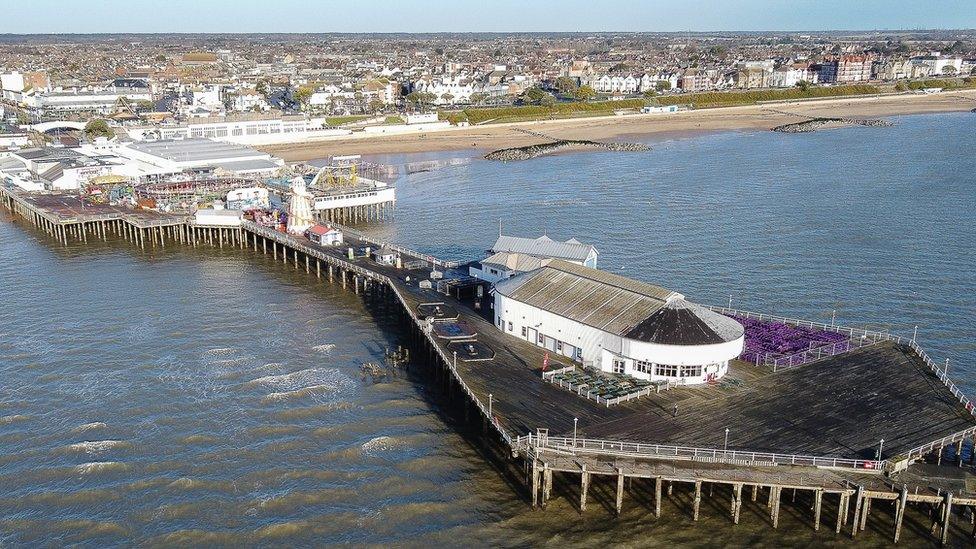
Clacton Pier, which began as a landing stage for paddle steamers, is the largest leisure pier in Europe by surface area
With its promenade, pier and golden sands, Clacton-on-Sea epitomises the British seaside town - but it was not always so. As it celebrates 150 years, the BBC looks at how one man's vision transformed the area into the resort we know today.
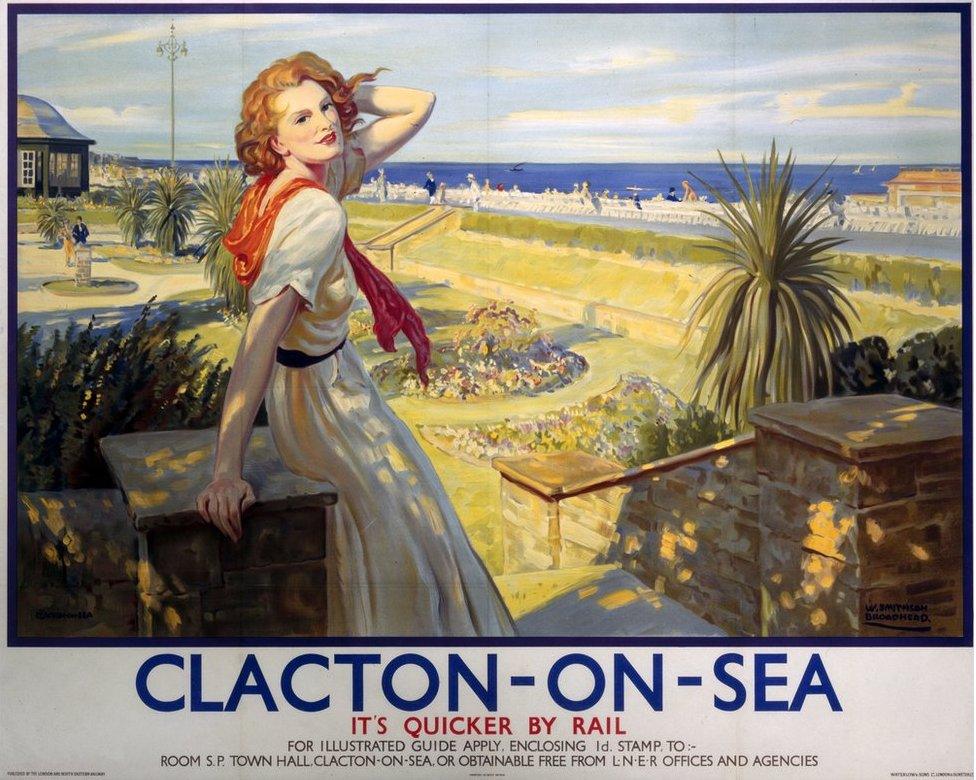
Clacton-on-Sea had always been marketed as the perfect getaway for people in London and its suburbs
Farmland, rough cliffs and the North Sea. That was all that greeted Peter Bruff when he visited Great Clacton in Essex.
But the Ipswich-born civil engineer and entrepreneur, who had played a major part in establishing the railway in East Anglia, knew an opportunity when he saw one.
"Before Peter Bruff, it was just farmers' fields, there was nothing here," said local historian Richard Walker.
"It was his vision - he saw that potential and he got investors involved."
Bruff was well aware of the growing popularity of "seaside bathing" and how Frinton, Walton-on-the-Naze and this empty patch of land on the Essex peninsula could entice Londoners.
Clifftop walks - and little else
"He bought a farm close to the coast, which is where Clacton is today, and he got investment from the Woolwich Steam Packet Company," said Roger Kennell, another local historian.
"Bruff built the pier, which was just a landing stage at that time, and the first construction in Clacton.
"In July 1871 - 150 years ago - the first pleasure steamer, The Queen of the Orwell arrived.
"There was no railway in Clacton then, it was the only way to get there.
"There could be 200 to 300 people, with a top deck and a cabin below, and they'd board at Tower Pier [on the Thames] in London and come to Southend and Clacton, or up to Felixstowe and Southwold."
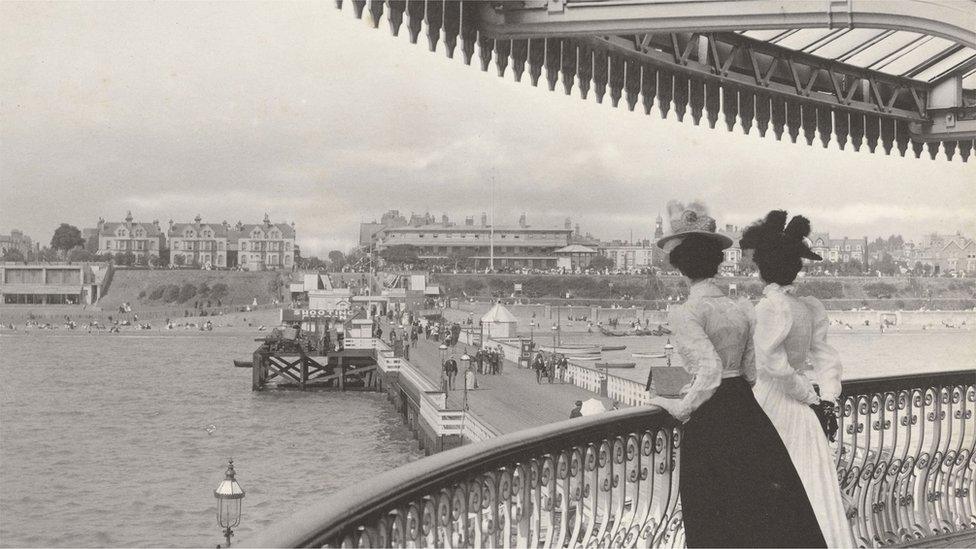
The extended pleasure pier with its "shooting saloon" in an undated photograph, believed to be 1880 to 1920
There was certainly no candy floss and amusements for those early visitors, or anywhere to stay the night until the Royal Hotel was built the following year.
"You could walk on the beach or along the clifftop to the Martello Tower," added Mr Kennell.
"It was a way to get away from London for a few hours, by the seaside, with its rough cliffs and sandy beaches," agreed Mr Walker.
'Summer season was heaving'
The year 1882 catapulted Clacton into the super league of seaside resorts. Bruff, who by then had established a railway line to Walton, created a spur to his pet project, Clacton. The railway had arrived.
Soon, the pier was lengthened and a pavilion added, along with a promenade, gardens, theatre, cinema, boarding houses and a town centre.
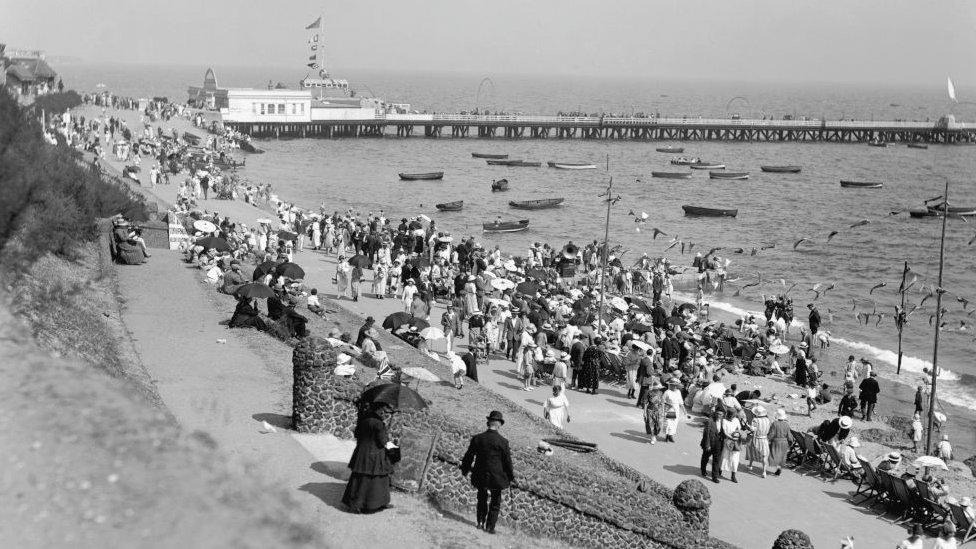
Clacton seafront and promenade in 1925, when many of its visitors would have arrived by rail
"Clacton-on-Sea developed into a great seaside resort, like Bournemouth, Blackpool and Great Yarmouth," explained Mr Kennell, who grew up in neighbouring Holland-on-Sea.
"In the 1950s, the summer season was heaving, and everything revolved around it.
"Those were the austerity years, and for the families coming on holiday, that week was a huge event of the year.
"Having to save up, leaving their lives in London in the factories to come to a seaside resort with the beach, the pier, the pavilion, the lovely gardens, the sports, the theatre, the cinema."
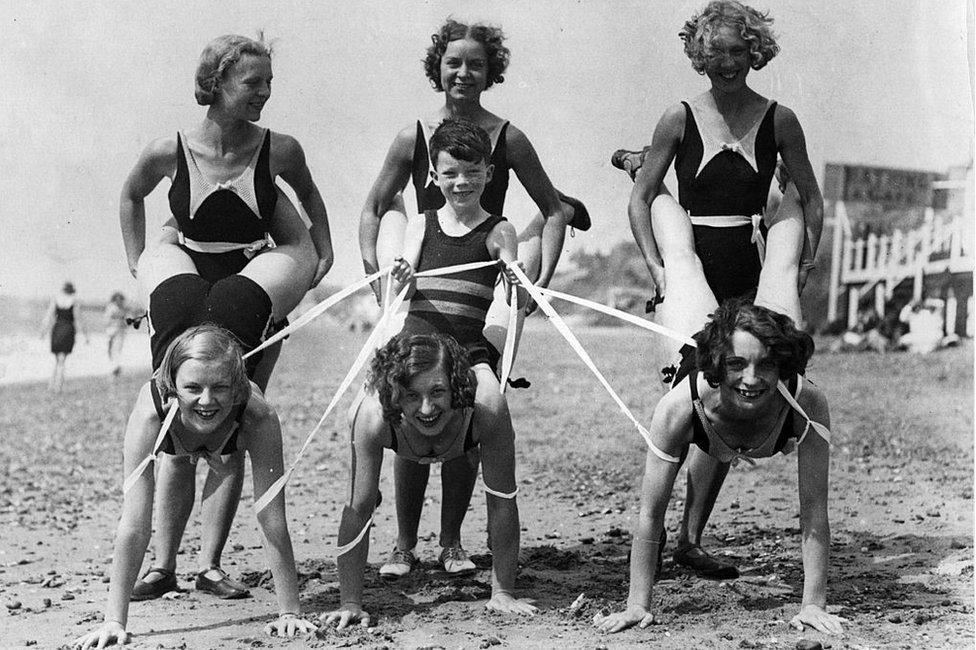
Beach games were all part of the fun at Clacton
Mr Walker added: "There were pleasure boats, floating rafts which you could swim out to and dive off, lots and lots of opportunities to enjoy yourself.
"The pavilion, the gardens, the parks - it was simply a great place to be.
"There was fun and excitement," said Mr Kennell.
"I enjoyed cycling into Clacton to be among the holidaymakers, and it's only now I realise how lucky I was."
'Barrow boys' waiting at station
Holidaymakers, arriving in their droves, commonly stuck to a fairly structured week, whether heading to Butlins, a caravan park, or the strict regulations of the landlady-run guesthouse, he added.
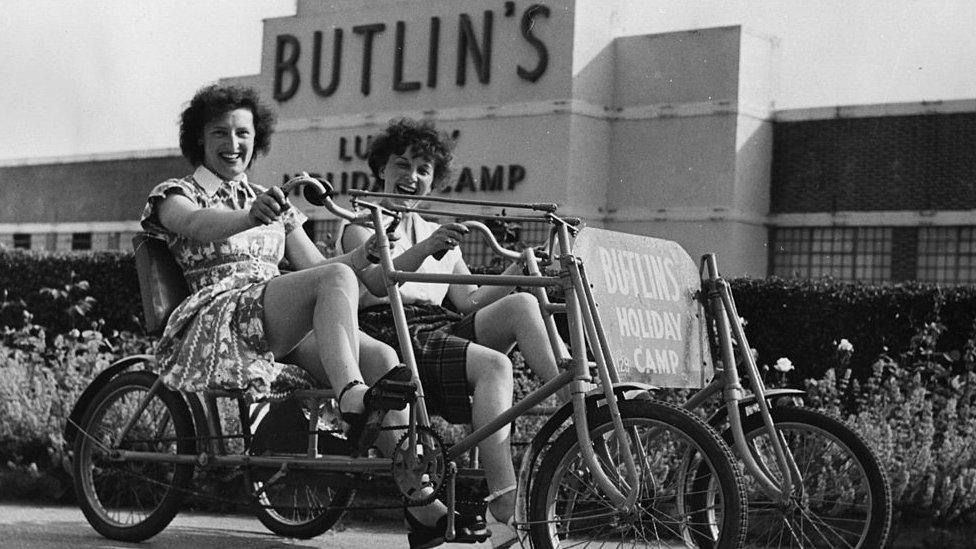
Butlin's, pictured in 1950, was a huge part of Clacton's popularity
"Saturday was change-over day, and people I knew were barrow boys and would wait at the station to wheel people's luggage to the guest houses.
"On Sunday, people got their bearings, Monday they would buy postcards, and on Wednesday there would always be a coach trip to Colchester, or Constable country.
"They go to the beach in the morning, have their lunch and evening meal at their guest house, and had not been able to return there before 5pm, even if it rained.
"Then in the evening would go see a show or walk along the prom to see the illuminations."
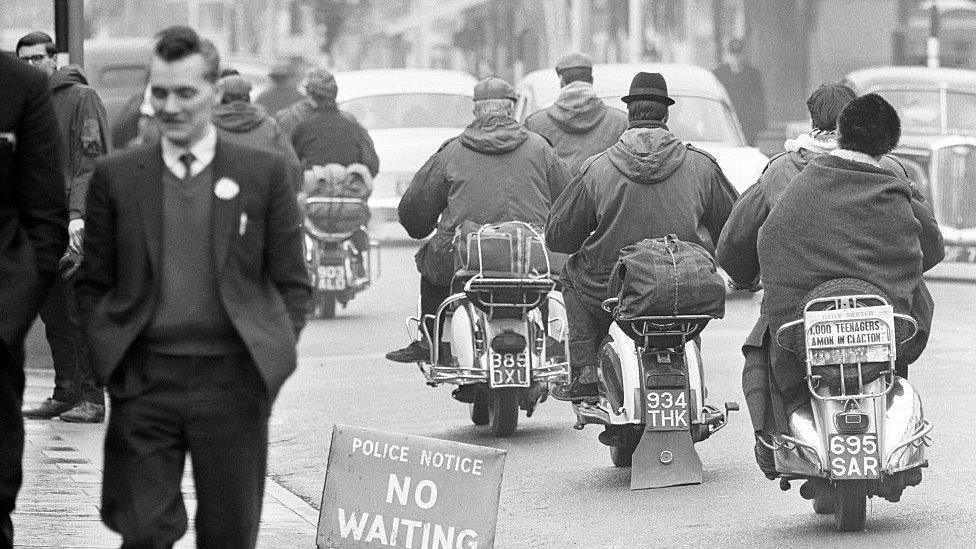
'1,000 teenagers amok in Clacton' reads the headline of the Daily Sketch in April 1964
Mods and rockers battled on the seafront in 1964, while teenagers seeking sedate pursuits could take boat trips to pirate radio ships, including Radio Caroline.
Mr Kennell said he remembered doing such a trip, with girls placing a song request and a stone in a matchbox before tossing it on deck for a DJ to find.
"Those were great days, the 1960s, the social change from what we had known in the 1950s," said Mr Kennell.
"By the 1970s and 80s people were more inclined to travel abroad, and hotels and guest houses started to close."
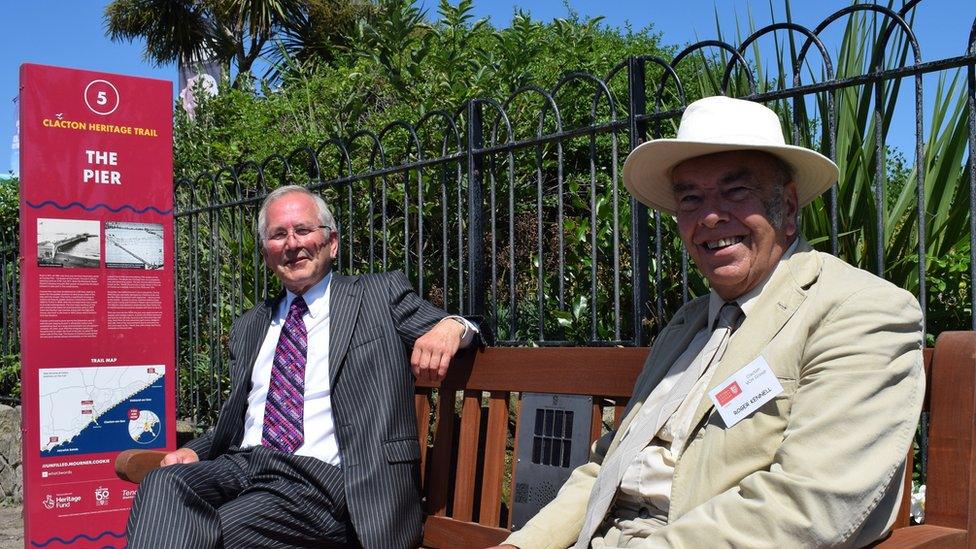
Richard Walker and Roger Kennell have helped create Clacton Heritage Trail, to mark the resort's first 150 years
Butlin's, which had opened its Clacton camp in 1938, closed in the early 1980s, which locals feared would be the death knell for the town.
"In the past eight to 10 years I've seen Clacton on the up again, with the investment in the pier and redevelopment," said Mr Kennell.
Mr Walker agreed.
"Package holidays really came into focus in the 1970s, but in the past couple of decades it's picked up and it's starting to be recognised as a great place to come for a week."
Tendring District Council, with the help of both Mr Walker and Mr Kennell, has installed a heritage trail along Clacton's promenade to mark its first 150 years.

Find BBC News: East of England on Facebook, external, Instagram, external and Twitter, external. If you have a story suggestion email eastofenglandnews@bbc.co.uk, external
Related topics
- Published17 April 2021
